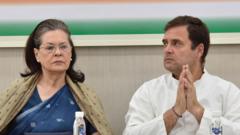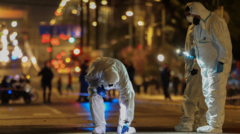The Indian political landscape is in turmoil following accusations of "vote theft" against the Election Commission, initiated by opposition leader Rahul Gandhi. The controversy revolves around alleged irregularities in voter registration that purportedly benefited the ruling BJP, leading to widespread protests and calls for accountability.
Controversy Erupts Over Allegations of Electoral Manipulation in India

Controversy Erupts Over Allegations of Electoral Manipulation in India
Opposition parties in India are accusing the Election Commission of vote manipulation in the 2024 elections, claiming it favored the ruling BJP.
A significant political controversy has emerged in India centered on allegations of electoral manipulation, with opposition parties accusing the Election Commission (ECI) of undermining the integrity of the 2024 general elections, a situation they claim favored the ruling Bharatiya Janata Party (BJP). Tensions escalated in Parliament on Tuesday, leading to its adjournment as opposition MPs clamored for a debate on the electoral process's fairness.
The situation intensified when a collective of opposition leaders, including Congress party's Rahul Gandhi, were temporarily detained while attempting to march to the ECI’s headquarters in Delhi. Gandhi first voiced these concerns on August 7, 2023, rallying support from a multitude of lawmakers against alleged electoral discrepancies.
Gandhi asserts there has been widespread voter manipulation, leveraging detailed data from the ECI itself to back his claims, despite vehement denials from both the election body and the BJP. Prime Minister Narendra Modi's recent victory, securing a historic third term, was marred by speculation that the BJP-led coalition did not achieve the expected majority. With a staggering voter turnout of 66%, nearly a billion individuals participated in the election, constituting one-eighth of the global population.
Focusing on the Mahadevapura region of Bangalore Central, Gandhi put forth alarming allegations of over 100,000 fraudulent entries in the voter list—featuring duplicate voters, incorrect addresses, and abnormal bulk registrations. He highlighted specific instances, including a voter reportedly casting their ballot twice and over 80 individuals registered at a single address. Gandhi argues that such irregularities cost the Congress party at least 48 seats, as they managed to secure 99 out of a possible 543, trailing behind the BJP's 240 seats. He has demanded the ECI make digital voter rolls public for auditing by the Congress and the public.
The ECI responded forcefully to Gandhi's claims, branding them “absurd” on social media and demanding an official declaration or an apology from him. The Karnataka branch of the ECI pointed out that formal objections regarding the electoral rolls had not been raised by the Congress during the revision process.
Top BJP officials condemned the allegations, with federal education minister Dharmendra Pradhan describing the situation as "anarchy" detrimental to democracy, while federal agriculture minister Shivraj Singh Chouhan accused the opposition of tarnishing the image of democratic institutions.
The intense political drama unfolds amidst a contentious review of electoral rolls in Bihar, where upcoming elections have brought the legitimacy of revised rolls into question. The Special Intensive Revision (SIR), aimed at identifying redundant or deceased voters, has faced criticism for potentially disenfranchising voters, particularly among minorities and migrants.
Reports from Bihar indicate that the draft rolls contained inaccuracies, such as wrong photographs and the names of deceased individuals. Currently, the Supreme Court of India is engaged in hearings regarding the SIR, with petitioners seeking clarity on the deletion of approximately 6.5 million names from the voter list.
As discussions continue around voter disenfranchisement, Gandhi has raised his allegations to a national level, suggesting systemic manipulation. He pointed to peculiar cases like a name on the draft list belonging to a 124-year-old voter, hinting that these issues signal broader discrepancies within the electoral framework. "Abhi picture baki hai," he ominously remarked, indicating there may be more revelations yet to come in this unfolding situation.


















